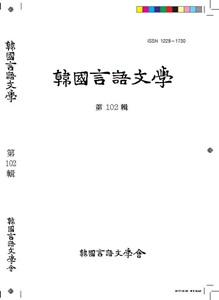학술논문
유치환 시에 나타난 ‘페르조나’와 ‘자기’의 발현 양상
이용수 264
- 영문명
- Aspect of Manifestation of ‘Persona’ and ‘Self’ in Yu Chi-Hwan s Poetry
- 발행기관
- 한국언어문학회
- 저자명
- 이지원(Lee Ji won)
- 간행물 정보
- 『한국언어문학』韓國言語文學 第103輯, 305~336쪽, 전체 32쪽
- 주제분류
- 어문학 > 한국어와문학
- 파일형태
- 발행일자
- 2017.12.30
6,640원
구매일시로부터 72시간 이내에 다운로드 가능합니다.
이 학술논문 정보는 (주)교보문고와 각 발행기관 사이에 저작물 이용 계약이 체결된 것으로, 교보문고를 통해 제공되고 있습니다.

국문 초록
영문 초록
This paper analyzed the aspect of manifestation of ‘Persona’ and ‘Self’ expressed in Yu Chi-Hwan’s poetry with the view point of analytical psychology of Calr Custav Jung. The aspect of manifestation of ‘Persona’ and ‘Self’ is a framework to understand the inner world of Yu Chi-Hwan and a material to prove the unique characteristics of Yu Chi-Hwan’s poem world. The poetic resonance made by the aspect revealed by Persona, i.e. ‘obsession and psychological disorder/molting desire and healing’ and the aspect of self-manifestation using the union of opposites, i.e. ‘Shadow/Light’, and ‘Sound/Silence’ is a unique poetic domain that can be created by only those who are intensely immersed in their inner world. It could be known that Yu Chi-Hwan’s awareness of life is accord with the desire of self-realization. Also the contradictoriness of Yu Chi-Hwan’s poem is the main factor that arouse the poetic collision caused by the psychological opposite poles of ‘Persona/Self’. This has to be understood in the manner of the unique existing method of Yu Chi-Hwan’s poem which is directed by the structure of psychological opposite poles of ‘Persona/Self’. The aesthetics of paradox created by this process acts as a driving force forming the unique poem world of Yu Chi-Hwan. This paper found the source generating the aesthetics of paradox at the structure of opposite poles, namely the union of opposites contributing to self-embodiment. The union of opposites in Yu Chi-wan’s poetry is a poetic practice for penetrating into self and a poetic effort for self-realization. Therefore, the value of Yu Chi-Hwan’s poetry is on the point that he aesthetically embodied ontological questions and answers in his poetry in order to be wholly what he is without living imperfectly with being locked in Persona, This paper serves as a momentum to give a new proof for Yu Chi-Hwan’s poetry that have been analyzed with some unsophisticated flat structure so far. This work becomes a useful implication to understand the psychological structure of literary works and psychological conditions of authors.
목차
1. 들어가는 말
2. 페르조나에 갇힌 자아의 양면성
2.1. 페르조나의 집착과 신경증
2.2 페르조나 탈피 욕망과 내적 치유
3. 대극의 합일을 통한 자기의 형상화
3.1. ‘그림자/빛’의 합일과 전일성
3.2. ‘소리/침묵’의 합일과 초탈의 세계
4. 맺는 말
<참고문헌>
키워드
해당간행물 수록 논문
- 언간 규식서의 투식적 표현과 한글 편지에의 실현 양상 연구
- 서사문학의 익명성과 개성화에 대한 일고찰
- <해녀노젓는소리> 사설에 나타난 지명 의미와 민속 지식
- 문예지 지평선과 신대륙의 문학사적 의미
- 죽도주인전(竹島舟人傳) 연구
- 현대 서사 문화 속의 제주 해녀
- 조선 후기 영남지역 가사에 나타난 道統구현 양상과 그 의미
- 공기어를 통해 본 방송사의 포지션(position)에 대한 연구
- 학문 목적 유학생의 글쓰기 교육과 교재에 대한 일 고찰
- 『松窩雜說』의 필기문학상 위상에 대하여
- 해녀 도구어의 낱말밭 연구
- 유치환 시에 나타난 ‘페르조나’와 ‘자기’의 발현 양상
- 나도향 소설과 낭만적 자아의 윤리
참고문헌
관련논문
어문학 > 한국어와문학분야 BEST
- 국어의 줄임말 현상에 따른 언어변이 양상과 문제점
- ‘밈(meme)’을 활용한 고전문학과 문화콘텐츠의 상호 협력과 융복합교육
- 연구 동향 분석을 통해 본 학문 목적 한국어교육 연구의 실태와 제언
최근 이용한 논문
교보eBook 첫 방문을 환영 합니다!

신규가입 혜택 지급이 완료 되었습니다.
바로 사용 가능한 교보e캐시 1,000원 (유효기간 7일)
지금 바로 교보eBook의 다양한 콘텐츠를 이용해 보세요!






